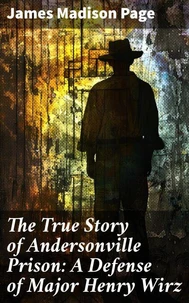The True Story of Andersonville Prison. Civil War Memories Series
Par :Formats :
Disponible dans votre compte client Decitre ou Furet du Nord dès validation de votre commande. Le format ePub est :
- Compatible avec une lecture sur My Vivlio (smartphone, tablette, ordinateur)
- Compatible avec une lecture sur liseuses Vivlio
- Pour les liseuses autres que Vivlio, vous devez utiliser le logiciel Adobe Digital Edition. Non compatible avec la lecture sur les liseuses Kindle, Remarkable et Sony
 , qui est-ce ?
, qui est-ce ?Notre partenaire de plateforme de lecture numérique où vous retrouverez l'ensemble de vos ebooks gratuitement
Pour en savoir plus sur nos ebooks, consultez notre aide en ligne ici
- Nombre de pages144
- FormatePub
- ISBN859-65--4777240-8
- EAN8596547772408
- Date de parution09/12/2023
- Protection num.Digital Watermarking
- Taille676 Ko
- Infos supplémentairesepub
- ÉditeurGOOD PRESS
Résumé
In "The True Story of Andersonville Prison, " James Madison Page delivers a harrowing and meticulously researched account of one of the Civil War's most infamous prisons. Through a combination of vivid narrative and historical analysis, Page captures the desperate conditions faced by Union soldiers confined at Andersonville, illustrating the profound struggles for survival amid overcrowding, disease, and malnutrition.
His literary style, characterized by evocative prose and a rigorous adherence to historical fact, situates the book within the broader context of Civil War literature, emphasizing the human cost of warfare and the moral complexities surrounding the treatment of prisoners. James Madison Page, a dedicated historian and novelist, draws upon extensive primary sources, including survivor testimonies and military records, to construct an authentic portrayal of the prison'Äôs notorious legacy.
His passion for uncovering hidden histories is rooted in his own familial ties to Civil War veterans, which deeply informs his commitment to honoring their experiences. Page'Äôs background in both history and literature combines to create a compelling narrative that bridges the gap between academia and the general reader. Recommended for historians, students, and anyone interested in a gripping exploration of one of America's darkest chapters, "The True Story of Andersonville Prison" is not only a significant contribution to Civil War scholarship but also a poignant reminder of the resilience of the human spirit in the face of insurmountable adversity.
His literary style, characterized by evocative prose and a rigorous adherence to historical fact, situates the book within the broader context of Civil War literature, emphasizing the human cost of warfare and the moral complexities surrounding the treatment of prisoners. James Madison Page, a dedicated historian and novelist, draws upon extensive primary sources, including survivor testimonies and military records, to construct an authentic portrayal of the prison'Äôs notorious legacy.
His passion for uncovering hidden histories is rooted in his own familial ties to Civil War veterans, which deeply informs his commitment to honoring their experiences. Page'Äôs background in both history and literature combines to create a compelling narrative that bridges the gap between academia and the general reader. Recommended for historians, students, and anyone interested in a gripping exploration of one of America's darkest chapters, "The True Story of Andersonville Prison" is not only a significant contribution to Civil War scholarship but also a poignant reminder of the resilience of the human spirit in the face of insurmountable adversity.
In "The True Story of Andersonville Prison, " James Madison Page delivers a harrowing and meticulously researched account of one of the Civil War's most infamous prisons. Through a combination of vivid narrative and historical analysis, Page captures the desperate conditions faced by Union soldiers confined at Andersonville, illustrating the profound struggles for survival amid overcrowding, disease, and malnutrition.
His literary style, characterized by evocative prose and a rigorous adherence to historical fact, situates the book within the broader context of Civil War literature, emphasizing the human cost of warfare and the moral complexities surrounding the treatment of prisoners. James Madison Page, a dedicated historian and novelist, draws upon extensive primary sources, including survivor testimonies and military records, to construct an authentic portrayal of the prison'Äôs notorious legacy.
His passion for uncovering hidden histories is rooted in his own familial ties to Civil War veterans, which deeply informs his commitment to honoring their experiences. Page'Äôs background in both history and literature combines to create a compelling narrative that bridges the gap between academia and the general reader. Recommended for historians, students, and anyone interested in a gripping exploration of one of America's darkest chapters, "The True Story of Andersonville Prison" is not only a significant contribution to Civil War scholarship but also a poignant reminder of the resilience of the human spirit in the face of insurmountable adversity.
His literary style, characterized by evocative prose and a rigorous adherence to historical fact, situates the book within the broader context of Civil War literature, emphasizing the human cost of warfare and the moral complexities surrounding the treatment of prisoners. James Madison Page, a dedicated historian and novelist, draws upon extensive primary sources, including survivor testimonies and military records, to construct an authentic portrayal of the prison'Äôs notorious legacy.
His passion for uncovering hidden histories is rooted in his own familial ties to Civil War veterans, which deeply informs his commitment to honoring their experiences. Page'Äôs background in both history and literature combines to create a compelling narrative that bridges the gap between academia and the general reader. Recommended for historians, students, and anyone interested in a gripping exploration of one of America's darkest chapters, "The True Story of Andersonville Prison" is not only a significant contribution to Civil War scholarship but also a poignant reminder of the resilience of the human spirit in the face of insurmountable adversity.



